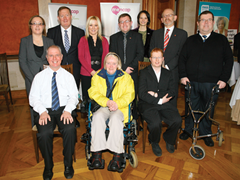All-party group on learning disabilities
 The number of all-party groups meeting at Stormont has increased in recent years but Pat Ramsey believes the learning disability group is still one of the most important. Emma Blee writes.
The number of all-party groups meeting at Stormont has increased in recent years but Pat Ramsey believes the learning disability group is still one of the most important. Emma Blee writes.
“There are a number of core Assembly members who have a reputation of being conscientious in all-party groups and then they’re caught,” jokes Pat Ramsey.
However, with seven of the groups to contend with, he is serious when he claims it is often “difficult to juggle” his time. As well as chairing the learning disability group, he also works on groups dealing with road safety, cancer and diabetes but remarks that the one he “gets a lot out of” is the learning disability group “because it’s so complex”.
The group was established in June 2009 and members meet four times a year to discuss specific themes. Ramsey states that the group’s main aim is to “promote the values and understanding of the man that is”. He believes it is important to encourage a better understanding of the problems facing people with a learning disability and their families. Influencing policy, legislation and services are also priorities.
Generally there is a lot of interest in the group, says Ramsey. It is supported by a committee of 14 learning disability organisations, and meetings are well- attended by the voluntary sector as well as the public. “[In] our last meeting, for example, there was standing room only. There was something like 60 or 70 people at that meeting,” he explains.
Each session includes speakers with a learning disability or a member of their family as well as relevant professionals. Civil servants are also present to answer questions.
Since its inception, the group has explored subjects such as the criminal justice system, housing options, and respite and short breaks.
One of the most “forthright” meetings the group has held was about the draft Budget, because “that was and clearly still is the biggest worry for people with a disability”. Frontline services are at risk and they “do not believe they are getting the appropriate services,” comments Ramsey.
Respite care
A meeting about respite care was intensive: “People always imagine respite care is when somebody is ill they go into an institution for a week or two to give the parents a break, but that’s not what the families are looking for. They are looking for more community-based respite care,” says the SDLP man.
It is a complex matter, and respite care should always be flexible and creative: “It could be about taking someone for a respite break for two or three hours a day to allow the family to get groceries or go to get hospital care themselves.”
While the all-party group might not always resolve every problem it is faced with, Ramsey claims it is useful: “What the all-party group does is that it enables individuals to come along. There’s no part where we say: ‘Does anybody want to make a case or a testimony about anything.’ But you might find somebody opening up.”
He recalls the first meeting he chaired where a woman with four children spoke about her “quite complex problems”, including housing issues. Alex Attwood was present and two weeks later the Minister had visited the woman at her home. “I’m not saying her problem has been solved but for a Minister to take time out to visit her was interesting,” says Ramsey.
Knowledge
It is vital for MLAs and ministers to gain knowledge from all-party groups. “The only way we can best deal with wider constituent issues is by having knowledge of them and I find the best way to get that is by listening to people about their problems. Then, if it comes up in discussion during a plenary session you can understand it a lot better and you can relate your issues directly,” comments Ramsey.
He is quick to denounce the idea that all- party groups are just “talking shops”. Each group is important, he says, as they provide an important line of communication between members of the public and departmental officials and ministers.
“That’s why irrespective of what the subject matter is in an all-party group, people see the importance of it and that’s why for the past two years there has been acceleration in the number of groups being set up.”
Mencap is the Secretariat for the learning disability group and Ramsey says this is a big help as not all groups are so well organised: “I’m chair of the all-party group on road safety and it’s a very difficult group to manage. You don’t have a core secretariat to help you out with that one. I would be expected to manage that and it’s very difficult to get the time.”
However, Ramsey says most of the work is enjoyable and rewarding: “At the end of the day you wouldn’t be in politics if you weren’t trying to improve things and that’s what you’ve got to do.”





